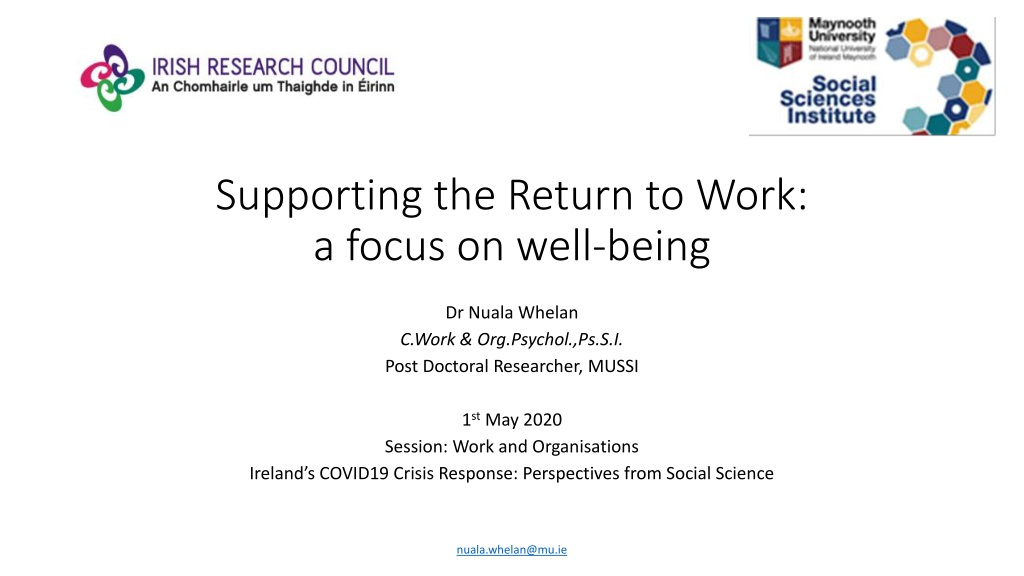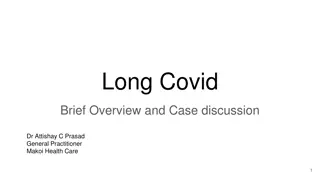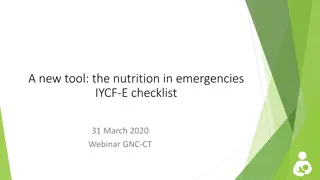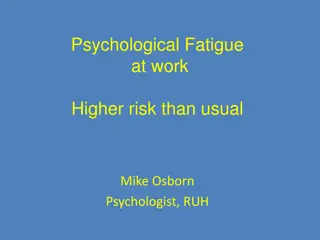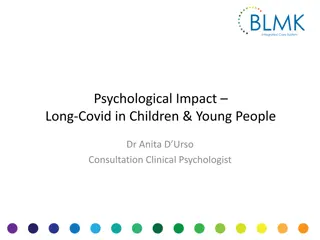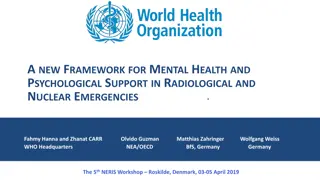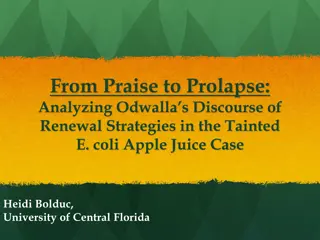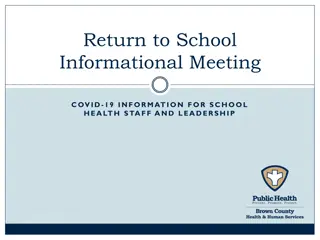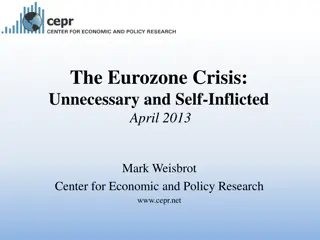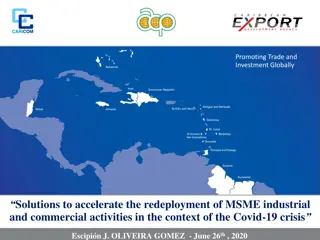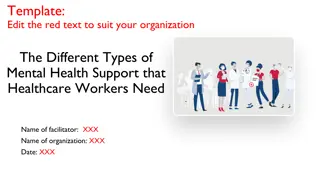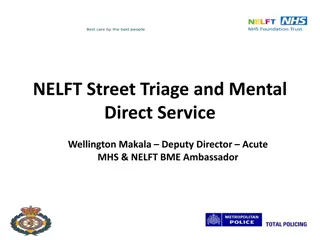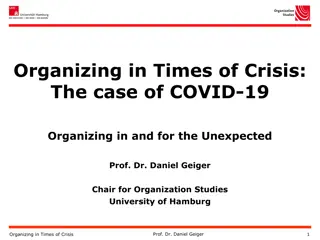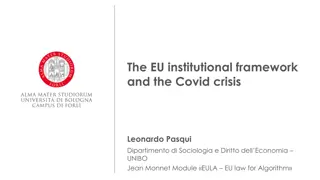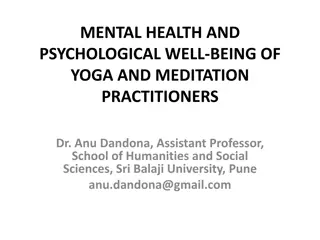Supporting Well-Being for Return to Work Amidst COVID-19 Crisis: Focus on Psychological Health
Amidst the challenges of returning to work post-COVID-19, it is essential to prioritize well-being and psychological health for a successful transition. Dr. Nuala Whelan's research sheds light on the impact of unemployment, emphasizing the need for support in job matching, upskilling, and psychological care to address collective and individual traumas. The psychological effects of unemployment on well-being and re-employment are significant, highlighting the importance of holistic support systems.
Download Presentation

Please find below an Image/Link to download the presentation.
The content on the website is provided AS IS for your information and personal use only. It may not be sold, licensed, or shared on other websites without obtaining consent from the author. Download presentation by click this link. If you encounter any issues during the download, it is possible that the publisher has removed the file from their server.
E N D
Presentation Transcript
Supporting the Return to Work: a focus on well-being Dr Nuala Whelan C.Work & Org.Psychol.,Ps.S.I. Post Doctoral Researcher, MUSSI 1stMay 2020 Session: Work and Organisations Ireland s COVID19 Crisis Response: Perspectives from Social Science nuala.whelan@mu.ie
Supporting people back to work - the challenge Stability Report Update (DOF April 21 2020) ROI Unemployment Projection 584,000 Pandemic Unemployment Payment 212,000 Live register in March 2020 281,000 / 46,000 employers Temporary Wage Subsidy (DEASP April 20 2020)
Some groups hit more than others 140000 40 35 120000 30 Av. hourly earnings 100000 25 No. of claimants 80000 20 60000 15 40000 10 20000 5 PUP Claimants Av. Hourly earnings Q4 2019 0 0 Accommodation and food services Wholesale and retail Trade; Repair of Motor Vehicles and Motorcycles Construction Administration and Support Service Activities Manufacturing Professional Scientific and Technical Activities Human Health and Social Work Activities Education Transportation and storage Public Arts, Financial and insurance activities Information and communication activities Agriculture, Forestry amd Fishing; Mining and Quarrying Real Estate Electricty, Gas, Water Supply, Waste Management Admininistration and Defence; Compulsory Social Security entertainment and recreation Sources: DEASP 2020 (https://www.gov.ie/en/news/041fd1-update-on-payments-awarded-for-covid-19-pandemic-unemployment-paymen/) and CSO 2020 (https://www.cso.ie/en/releasesandpublications/er/elcq/earningsandlabourcostsq32019finalq42019preliminaryestimates/). Young people, Women, Workers in low skill employment
Caring for a recovering labour force Response of PES will be important job matching, upskilling, support . But what about the Psychological health of labour force? China one month into Covid outbreak unemployed/stopped working worse mental and physical health, distress (Zhang et al., 2020) Responding to crisis induced mass unemployment Collective trauma overwhelming, triggering stress and anxiety Individual trauma intensified existing traumas, grief and loss Responses must not be trauma inducing While not everyone has been traumatised, lives have been severely disrupted, need to debrief before exploring options.
Psychological impact of unemployment financial rewards Health and societal impacts of unemployment psychological well-being and re-employment negatively affected (Murphy & Athanasou, 1999; Paul & Moser, 2009; Wanberg, 2012) physical and mental acctivity time structure Employment Research has linked unemployment to over 100 psychological variables (including anxiety, poor cognitive performance, suicidal ideation, low motivation, psychosomatic problems etc.) use of individual abilities social contact financial penalties opportunity for skill development Lower levels of psychological well-being amongst the unemployed when compared to their employed counterparts and general population (Leana & Feldman,1994) mental wellbeing skill depletion Unemployment (absence of employment) Effects are often multiple decreased well-being, high levels of psychological stress, loss of confidence, low self esteem (Eden & Aviram, 1993; Koen et al., 2013) physical wellbeing personal 'self' societal
Can we learn from previous research? Providing adequate psychosocial supports for the labour force should be evidence informed clear markers of what works and for whom but Opportunities to develop and test effective responses are rare So gather related evidence to inform our decisions Theories e.g. Latent Deprivation model (Jahoda 1981,1982, 1987), Agency Restriction (Fryer, 1986), Vitamin model (Warr, 1987) psychologically good and bad jobs / psychologically good and bad unemployment Recognise manifest and latent benefits of work, and agency skill use, goal setting, security Maintaining and preserving these benefits must be part of PES response Best practice guidelines and principles Evidence based interventions e.g. RCTs, longitudinal studies, quasi experiments Learning from wider psychology (social, clinical, W&O, career guidance) and social sciences Build on current feelings of national solidarity - a collective Back to Work Campaign promote a culture of care and hope
Looking after our labour force Design of Services Daily practice of activation Career Development- promotes life effects, ability effects, self perception effects, opportunity-perception effects, opportunity effects (Redekopp & Huston, 2020) Evidence informed what works and for whom Post disaster psycho social interventions (Hobfoll et al., 2007) Sense of safety Calming Sense of self and community efficacy Connectedness Hope Mental health three Rs of anxiety management (Resilience, Reframing, Recovery) (Lucey, 2020) Recent RCT effectiveness of LES approach reducing levels of psychological distress, increasing hopefulness, self-esteem, career efficacy and perceived employability (Whelan, 2018) Trauma informed care Safety Trustworthiness and transparency Collaboration Empowerment Choice intersectionality Coalesce positive personal and psychosocial outcomes (Whelan & Murphy, 2019) Capacity and Competence Robust Triage and Profiling Delivering individualised services social distance
What are the Labour Market Policy choices. Life First Flourishing/Work-Life Human Capital Work First Holistic Capability, Well-being Skill / Competence development Avoids prolonged unemployment Prioritising life needs Empowering Sustainable access Intensive job search Freedom to choose Capability / Well-being In-work transitions/ Speedy return to work Co-design career development Monitoring activity/compliance Networked / Flexible How and with whom we use these approaches Much depends on the demand side supports Achieving the right balance between caring for the labour force and re-igniting the economy
Take home points Recognise negative psychological impact of unemployment and crisis related anxiety and distress Acknowledge varying needs and heterogeneity of labour force Promote a culture of care and hope Creatively utilize all public, private and not-for-profit resources to co-create an Public Employment Eco-System to satisfy basic needs for guidance and support back to sustainable work and well-being Build on current feelings of national solidarity - a collective back to work campaign Be informed by evidence, principles and values Strengthening the positive mental health and well-being of the labour force and promoting hopefulness and self-efficacy should be core objectives of our national response Based on research conducted by Dr Mary Murphy, Dr Nuala Whelan, Dr Michael McGann, Dr Philip Finn at Maynooth University Forthcoming Coalesce publication due 25th May and ZoomSeminar 5th June 2020 The High Road Back to Work: Developing a Public Employment Eco System for a Post-Covid Recovery
